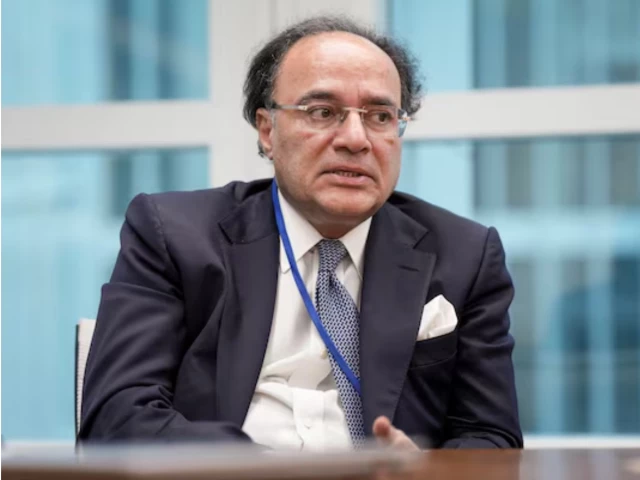Finance Minister Muhammad Aurangzeb speaks during an interview with Reuters at the 2025 Spring Annual Meetings of the IMF and the World Bank in Washington, DC, United States, April 25, 2025. Photo: Reuters/File
ISLAMABAD:
Finance Minister Muhammad Aurangzeb has forecast Pakistan’s economic growth of between 3.5 and 4 percent for the current fiscal year, despite the severe impact of recent monsoon floods that devastated farmlands, displaced more than four million people and killed more than 900 people across the country.
In an interview with Bloomberg, the finance minister said initial assessments showed damage to the country’s rice and cotton sectors, adding that more detailed assessments of the damage would take place in the coming months.
“It’s going to hurt our GDP growth,” he said. “My own view is that it will still be north of 3.5%, initially, but between 3.5 and 4.”
Before the floods, the Pakistani government forecast economic growth of 4.2% for the financial year ending next June.
“For us, climate change is not an academic question,” he said. “We are experiencing it, and the recent floods reflect it.”
Pakistan’s economy has stabilized after a near default on public debt two years ago. The country is expected to receive around $1.2 billion in loans from the International Monetary Fund after signing a staff-level agreement with the IMF, following a successful review of its $7 billion loan program.
The third loan tranche is expected to help support the country’s $407 billion economy, which has stabilized after narrowly avoiding a public debt default two years ago.
The IMF estimates that the country’s economy will grow between 3.25% and 3.5% in the fiscal year ending in June, despite destructive monsoon rains.
Pakistan forecasts that inflation could cross the upper end of its target range of 5-7% this year, weakening from a record high of 38% two years ago.
Meanwhile, Pakistan and the United States have moved to rebuild their military and economic ties after years of tension.
Economic ties have grown thanks to a trade deal that imposes 19% tariffs on Pakistani goods, lower than regional peers and well below the 50% tariffs imposed on rival India, Bloomberg reported.
The finance minister also said Pakistan plans to issue its first tranche of yuan-denominated debt – known as Panda bonds – by the end of November or early December.
The $250 million issuance is key to diversifying the country’s financing channels, he said. “We exploited the US dollar market, we used the euro, we used the Islamic sukuk, but we had not accessed the second largest and deepest capital market in the world,” he said.




